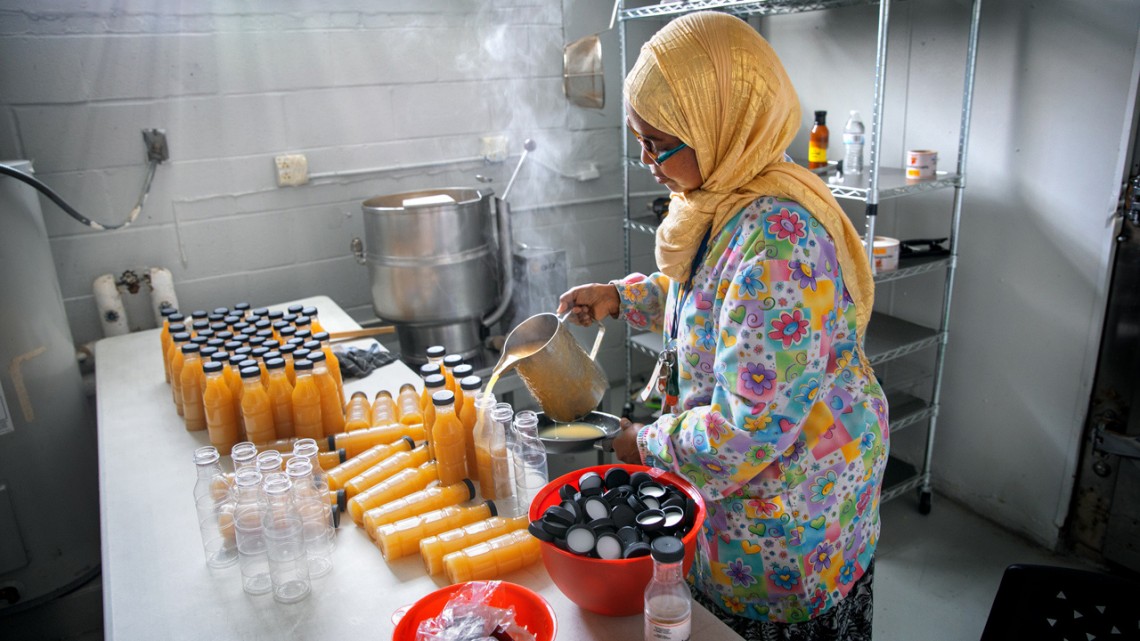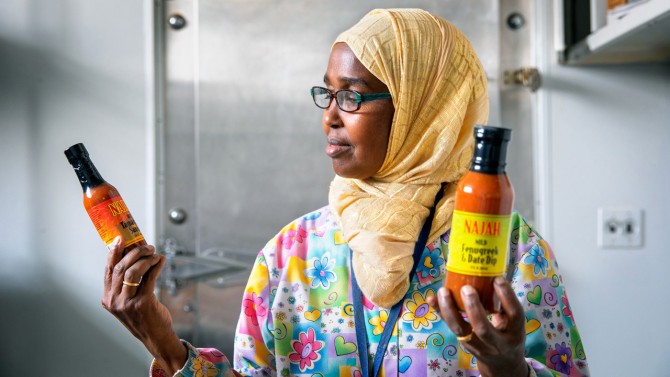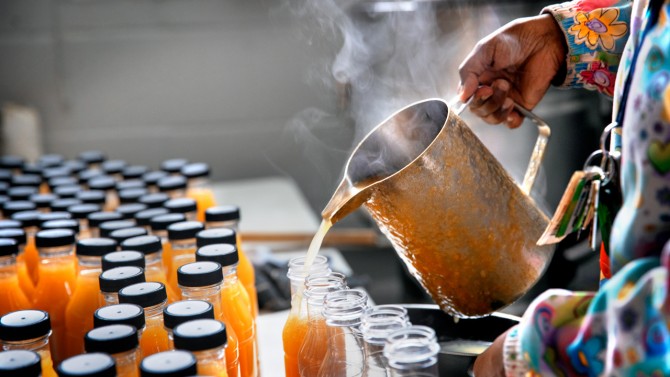
Bisharo Ali prepares bottles of apple fenugreek juice.
Cornell Food Venture Center feeds Somali immigrant’s dream
By Krishna Ramanujan
Bisharo Ali has a dream – to get her Najah brand natural sauces and juice drinks on the shelves of every grocery store in the U.S. What began as family recipes from her native Somalia are now commercial products, thanks in part to help from the Cornell Food Venture Center (CVFC).
The Geneva, New York-based center informs and advises small food manufacturers about food safety standards and regulations and provides tools, techniques and solutions for meeting those codes.
The center – the only one of its kind in New York state to offer affordable help navigating the complicated world of food safety regulations – is an invaluable resource to small business owners, especially ones like Ali, who arrived in the U.S. as a refugee in the mid-1990s.
“With any kind of food business, people are working and creating their own jobs, creating their own opportunities, and there are roadblocks. Regulation in food safety is certainly something that they need to navigate to bring a product to market,” said Bruno Xavier, Ph.D. ’08, a food microbiologist and extension associate at the CFVC. The center’s staff, including Xavier and center director Olga Padilla-Zakour, Ph.D. ’91, professor and chair in the Department of Food Science, evaluate product samples and can recommend, for example, appropriate processing temperature or acidity adjustments, optimal equipment and packaging and how to create a standard overall process, called a scheduled process.
Any small food business owner in New York state can receive a scheduled process for about $100, a deeply discounted rate due to the CFVC’s focus on small businesses and their issues and the sheer volume of work the center processes. Also, New York state-based food businesses get discounts, made possible in part by current and previous state grants awarded to the program.
Ali makes an apple fenugreek drink, and marinade and dipping sauces that have either a fenugreek or a tamarind base, traditional ingredients known for their health benefits in Somalia. Since coming to the U.S., Ali lived in Minnesota for 16 years before she, her husband and nine children settled in Buffalo in 2010. It was there that friends, family and business advisers who tasted her sauces encouraged Ali to start her own company. She also received help from the Westminster Economic Development Initiative.
A brochure on how to start a business provided by the Small Business Development Center at Buffalo State University pointed her to the CFVC, which is part of Cornell AgriTech. She made an appointment and traveled to Geneva in 2016.
“I was very nervous and confused … but they were very nice, all the people I met,” Ali said.
“The biggest challenge was communication,” Xavier said. “It was challenging to understand the product concept and the details about the manufacturing process.” Once they had an understanding, they worked together to optimize the products so they conformed to food safety regulations, without compromising on quality, Xavier said.
After testing her sauces, the center recommended that she create a standard recipe and adjust the concentration of vinegar she used to establish the acidity to keep the sauces stable on the shelf.
“You know how experienced cooks work, they add a little bit of this, a pinch of that, so we have to translate those traditional recipes into a scheduled process to get an exact and reproducible formula,” Xavier said. This includes converting volumes into weights for each ingredient. Ali shifted from using fresh tomatoes to canned, because when scaling up her production process, she couldn’t always get enough fresh tomatoes on a schedule.
She also enrolled in and completed the course, Acidified Foods, through Cornell’s Better Process Control School.
And, she had her kitchen approved for commercial use by state food safety inspectors, for which she needed documentation provided by the CFVC.
Now, Ali sells her healthful sauces, which come in mild and hot varieties, in eight stores in the Buffalo area. “My goal is to move my product through every store in America,” she said. Along with running Najah, a Somali word for “success,” she manages a household and children.
Her next step is to find investors and scale up, she said. It turns out, the CFVC’s Pilot Plant has all the necessary equipment to adjust the formula and process to scale up to 100-gallon batches, for a fee.
“Her tamarind sauce is really good,” Xavier said. “It has a surprising flavor twist that blows your mind.”
Media Contact
Get Cornell news delivered right to your inbox.
Subscribe



